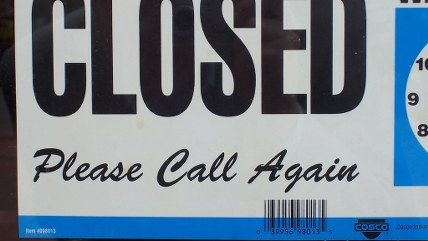Montreal Bans New Restaurants to Protect Incumbents
'Montreal has one of the highest restaurant per-capita ratios in North America and the amount of places to eat is worrying local politicians.'


About fifteen years ago, my girlfriend Roxanne and I drove from my parents' house in Massachusetts to Montreal for a weekend vacation. We'd both been to Montreal previously, but had never traveled there together.
While in the city, we spent some time seeing the great sights—Mont Royal, Tim Horton's, Canadian Tire—and ate a bunch of great food, including what Roxanne to this day insists is, hands down, the best filet mignon she's ever eaten.
We also checked out the colorful turf at Olympic Stadium, where we took in an Expos game. I picked up one of the team's great T-shirts—which I still own, and which features the 'Spos logo atop this team's perennial question: ''Why not us? Why not now?''
When the year ended, the World Series again wasn't theirs. Why not the Expos? Why not now? As had always happened, they simply weren't good enough. (A 1994 baseball strike—when the Expos most certainly were good enough—dashed the Expos' hopes for a World Series victory. But that's a story for another day).
Soon after we saw the Expos play, the team left Montreal for good, settling in Washington, D.C., where it's continued to be a talented and perennial also-ran.
Sadly, the restaurant where Roxanne ate her legendarily great steak, Sans Menu, also closed in recent years.As with the Expos inability to compete, perhaps competition from Montreal's vibrant dining scene was to blame for Sans Menu's closure. If that's the case, then it's possible, as recent reports indicate, that Sans Menu may have closed too soon.
That's because lawmakers in Montreal have moved to crack down on new restaurants, in an odious attempt to protect existing ones.
"Montreal has one of the highest restaurant per-capita ratios in North America and the amount of places to eat is worrying local politicians," reads a Canadian Press piece from earlier this week.
If that sounds awful and weird, that's because it is. Studies of the best places to eat often conclude that the more restaurants a city has per-capita, the better its restaurant scene. It's no surprise that the more choices a consumer has, the better off that consumer is.
Montreal does have an impressive number of restaurants. Data shows Montreal trails only New York City in terms of restaurants per capita in North America. As in New York City, that competition is great for Montreal's consumers. But it puts pressure on incumbent restaurateurs. So lawmakers have decided to side with the latter.
The worry expressed by lawmakers has turned into a ban on new restaurants from opening within 25 meters of an existing one along the city's Rue Notre Dame, the street the now-shuttered Sans Menu once called home. Notably, the action comes as "a number of commercial and retail properties remain empty" in this same part of Montreal.
The law "risk[s] turning the city's restaurant scene into a heavily bureaucratized nightmare like the province's construction industry," says the head of Quebec's restaurant association, who notes that real threats to the industry come from "road construction, high property and licensing taxes, as well as the potential for a $15 hourly minimum wage."
Predictably, though, some protectionist restaurateurs support the measure.
"In Montreal you can apply for a restaurant permit and get it immediately—that's a problem for me" says David McMillan, a supporter of the restrictions, whose high-end restaurant, Joe Beef, is an intended beneficiary of the ban.
He's not alone.
"I don't believe in the free market anymore," says restaurateur Carlos Ferreira. "We have to protect the good restaurants."
Ah, yes. The "good" ones. That's clearly an objective question upon which government can and should rule.
This reprehensible backlash against competition in the restaurant industry is, I believe, the logical conclusion of years of so many dumb arguments against food trucks. For years, many restaurateurs have claimed that they should be protected against competition from food trucks. To that argument, food-truck supporters often respond that, well, shucks, Mr. Restaurateur, how come you're trying to get the government to prevent a food truck from operating nearby you once in a while but you're not trying to get that same government to bar another brick-and-mortar restaurant from opening up next door to you and competing against you all day, every day?
Speaking of food trucks, Montreal recently ended its decades-long ban on food trucks, with a twist. Food trucks can't park within 60 meters of a brick-and-mortar restaurant. Also: "For food safety," reports a Canadian news service, "the trucks chosen will have to be associated with an already established restaurant."
VICE referred to this ass-backwards plan to pretend to allow food trucks in Montreal as "a Symbolic 'Fuck You' to Poor People and Immigrants."
''Why not us?" Montreal's baseball team once asked. "Why not now?''
The Expos lost because they weren't good enough to best the competition. When it comes to Montreal's restaurant scene, laws are trying to make sure the inability of some restaurateurs to compete doesn't get in the way of their winning.


Show Comments (172)